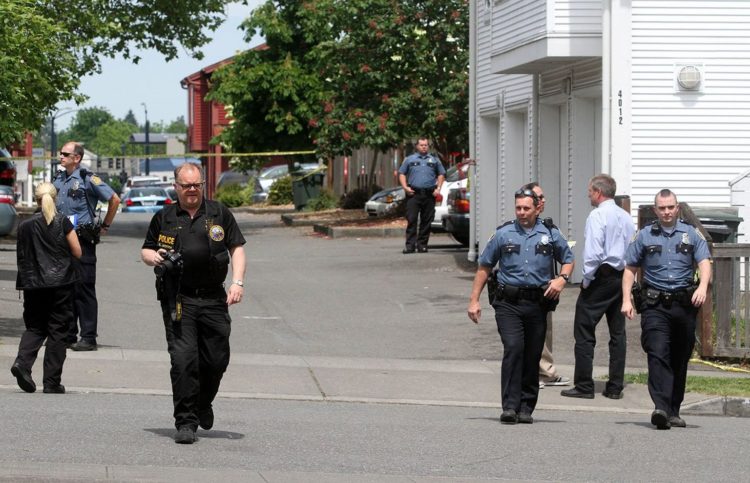Daryl Ford, 49, was discovered wrapped in a blanket inside a shopping cart in South Seattle by Seattle police in May 2014. Ford had been stabbed 87 times, according to an autopsy.
In 2019, the man accused of killing Ford was convicted of his murder after a mistrial. Michael Thompson’s conviction was overturned by the state Court of Appeals in November, and now King County prosecutors plan to prosecute him a third time for second-degree murder.
Thompson was re-charged on Monday and placed back into the King County Jail on Tuesday, according to jail and court records, after serving more than two years of a 313-year prison term. From the moment of his arrest in May 2014 until his sentence to prison in October 2019, he spent more than five years in prison.

Thompson’s 2019 conviction was overturned by the appellate judges after back-to-back superior court trial judges denied him an insanity defense because Thompson claimed he was inebriated on booze and crack cocaine and blacked out on the night Ford was killed.
Casey McNerthney, a spokeswoman for Prosecutor Dan Satterberg, said Thursday, “This was a brutal crime and we remain confident in our ability to prove the case at trial,” Because the case is still continuing, he declined to give specifics.
Thompson said he acted in self-defense when Ford reportedly tried to sexually assault him, according to court papers. Thompson has a developmental disability and a long history of post-traumatic stress disorder and serious depression with psychotic symptoms, according to court records.
Two specialists, a psychiatrist and a psychologist, both of whom testified in Thompson’s previous trials, agreed that Thompson was mad and would have reacted the same manner to an attempted sexual attack even if he hadn’t been drunk. However, according to court records, they also suggested that his intoxication may have played a part in exacerbating his paranoia at the time.
Insanity is a legal judgement that a defendant’s mind is so affected by a mental disease or defect that he or she is unable to understand the nature or quality of the act for which he or she is charged, or to distinguish right from wrong in relation to that act. An insane person cannot be held criminally liable.
Voluntary intoxication is not a defense in and of itself.
According to the Nov. 8 Court of Appeals judgment filed by Judge Stephen Dwyer, a condition that develops from voluntary drug or alcohol usage is not proof of insanity for many decades.
“But no Washington court has held that a defendant may not present evidence of insanity — caused by an involuntary mental illness — simply because there is also evidence that voluntary drug or alcohol use impacted the defendant’s mental state,” the opinion says. “If evidence is adduced that a defendant was impacted by an involuntary mental condition that caused insanity and was also impacted by voluntary drug or alcohol use at the time of the offense, the evidence of insanity should be presented to the jury, and the jury should be instructed to consider whether the impact of the involuntary condition alone would have rendered the defendant insane.”
The trial court erred by prohibiting Thompson from presenting evidence to support an insanity defense and based its pretrial finding on a misunderstanding of state law, resulting in an abuse of discretion, according to the opinion.

The Arrest and First 2 Trials
A woman noticed a man with a shopping cart full of bedding in her front yard on South Austin Street at 10:30 a.m. on May 22, 2014. She inquired as to what he was doing, and he said that he was washing laundry. He took a pair of jeans and some other clothing from the rubbish can and returned them to the shopping cart when she informed him he couldn’t use it.
The woman observed what she thought was a body wrapped in linen in the cart as he was hauling it out of her yard. Before walking away, she observed as the man moved the cart across the street and into the stairs of another house.
Police were called, and Ford’s body was located inside the shopping cart, wrapped in a blanket and tied with an electrical cord.
According to the charging documents, fingerprints recovered on the shopping cart and other evidence found in a rucksack heaped on top of Ford’s body led police to immediately identify Thompson as a suspect.
Thompson was a resident of Seattle Mental Health’s Kenyon House at the time, which offers residents with mental-health and behavioral care and is just a few blocks from where Ford’s body was discovered. Thompson and Ford were seen entering Thompson’s room together on the night of May 21, 2014, according to video surveillance footage obtained from the property. Despite the fact that Thompson was observed pushing an empty shopping cart into his room and a full shopping cart out the back door the next morning on film, Ford was not.
Thompson was detained at his wife’s house the day after Ford’s body was discovered.
On May 30, 2014, Thompson was charged with second-degree murder.
Thompson was ordered to Western State Hospital for a competency test in January 2016. According to court records, doctors decided that he had the ability to grasp the charges against him at the time and could speak with his attorney with a reasonable degree of rational understanding.
Thompson’s defense attorney stated in the months leading up to his first trial, which began in August 2017, that Thompson will use insanity and reduced capacity defenses, as well as self-defense and voluntary intoxication. (A diminished capacity defense involves expert testimony proving that a mental condition, but not insanity, hindered a defendant’s ability to develop the responsible mental state necessary to commit the act charged.) A defendant may pursue both insanity and reduced capacity defenses under state law.)
All four are affirmative defenses, meaning that the defendant must establish each one by a preponderance of the evidence.
However, according to court documents, during pretrial motions, Judge Mary Roberts determined that the defense was barred from pursuing an insanity defense, although she did permit affirmative defenses for reduced capacity, self-defense, and voluntary intoxication.
After 14 days of trial, Roberts declared a mistrial after deciding that Thompson was asked inappropriate questions about his decision to invoke his right to counsel and remain silent during cross-examination by former Senior Deputy Prosecutor Julie Kline. According to court papers, she specifically asked him why he didn’t report Ford for attempting to sexually assault him or for being armed with a knife.

Judge Patrick Oishi followed Roberts’ earlier pretrial rulings, including the one that barred Thompson from pursuing an insanity defense, before Thompson’s second trial began in late January 2019.
Thompson was found guilty by a jury on February 25, 2019.
Thompson’s conviction was reversed by the state Court of Appeals in November, and the three-judge court ordered the matter back to King County for further proceedings last month.
Thompson is scheduled to be arraigned on January 24 in lieu of $2 million bail. His defence attorney has yet to be identified, according to court documents.





















